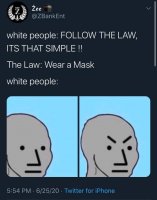Rasputin_Vol
"Slava Ukraina"
- Joined
- Aug 14, 2007
- Messages
- 70,953
- Likes
- 38,941
I assume you still have a wifi connection despite being 2 feet up your own ass since you post here, so I'm sure you can do some digging and see droves of people bitching and throwing tantrums over mask policies in grocery stores/gas stations.
But, if you must insist, check the third ****ing reply ITT.
Where the 3rd post did it say he was going to do what you suggest here?
If any business asks you to and you don't, you are inherently anti-capitalist.




